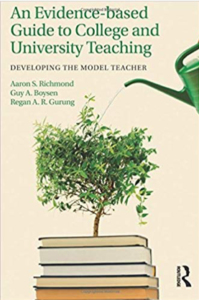By Aaron S. Richmond, Ph. D., Metropolitan State University of Denver
 Many college and university teachers incorporate great metacognitive activities into our course work with the lofty goal of trying to improve the metacognition of our students. These activities include various assessment techniques (see Richmond, 2017, March; Was, 2014, August), instructional interventions (see Draeger, 2016, November), and course designs (see McCabe, 2018, March). But have we ever questioned whether these Improve with Metacognition (IwM) educational practices are ethical? In other words, when we do these great activities, assessments, or other techniques, are we implementing them in an ethical way?
Many college and university teachers incorporate great metacognitive activities into our course work with the lofty goal of trying to improve the metacognition of our students. These activities include various assessment techniques (see Richmond, 2017, March; Was, 2014, August), instructional interventions (see Draeger, 2016, November), and course designs (see McCabe, 2018, March). But have we ever questioned whether these Improve with Metacognition (IwM) educational practices are ethical? In other words, when we do these great activities, assessments, or other techniques, are we implementing them in an ethical way?
The reason I embarked down this road was because I was having a conversation with one of my all-time favorite teachers (Doug Woody from the University of Northern Colorado) and we were discussing using active learning and metacognitive strategies in classroom instruction. He leaned over, mid-sentence, and said, “You know that sometimes, when done improperly, using  those [metacognitive instruction] strategies may cause students to feel disrespected, out of control, cause feelings of distrust, and in some rare occasions cause harm.” I just looked back at him with shock, incredulity, and a creeping sense of horror. Incredulity because I felt that I was trying to do the best thing for the student, so how could that be bad. Shock, because I had never thought of it that way and a creeping feeling of horror because just maybe, maybe he could be right.
those [metacognitive instruction] strategies may cause students to feel disrespected, out of control, cause feelings of distrust, and in some rare occasions cause harm.” I just looked back at him with shock, incredulity, and a creeping sense of horror. Incredulity because I felt that I was trying to do the best thing for the student, so how could that be bad. Shock, because I had never thought of it that way and a creeping feeling of horror because just maybe, maybe he could be right.
Ethical Teaching
But first, let me explain the nature of Ethical Teaching. Eric Landrum and Maureen McCarthy recently published the book Teaching ethically: Challenges and opportunities (2012). In their book, they discuss that ethical teachers focus on student’s respect and autonomy, nonmaleficience , beneficience, fidelity, and caring. Specifically, as teachers, we should allow students the right to make their own decisions (respect and autonomy), above all do no harm (nonmaleficience), promote our student’s welfare (beneficence), be fair, unbiased, and equal (justice), and be trustworthy and honest (fidelity). Thus, ethical teachers set out to improve their students’ learning by these guiding principles.
, beneficience, fidelity, and caring. Specifically, as teachers, we should allow students the right to make their own decisions (respect and autonomy), above all do no harm (nonmaleficience), promote our student’s welfare (beneficence), be fair, unbiased, and equal (justice), and be trustworthy and honest (fidelity). Thus, ethical teachers set out to improve their students’ learning by these guiding principles.
So how can IwM practices be potentially unethical? Again, when discussing this with Doug, my initial reaction was, “Of course not! I’m trying to IMPROVE my student’s metacognition. Which I KNOW will help them not only in my class, but throughout their college career.” However, upon reflecting and considering what it means to be an ethical teacher, it may be possible that implementing such IwM techniques improperly may in fact be unethical.
Let me illustrate. I’ve touted the use of Immediate Feedback Assessment Techniques (IF-AT) as a metacognitive tool for assessment (Richmond, 2017, February). IF-AT is used to instantaneously provide performance feedback to learners by allowing students to scratch off what they believe to be the correct answer on a multiple-choice exam, quiz or test. However, if implemented incorrectly, Can Metacognitive Instruction be Considered Unethical Teaching? Share on XIF-AT may cause to feel coerced (opposite of autonomy) into taking an assessment in this format that they don’t want to take or, more importantly that may cause them to do poorer than in other formats. For example, because IF-AT is so unique and takes some time to get to use to, students may feel that there is undue pressure on them to use this format without other options. A tenet of learner-centered pedagogy and ethical teaching is to provide options for students to choose from. Additionally, as I argued in the previous blog, using IF-AT, in some cases, may do more harm than good (opposite of nonmaleficience) if the format of IF-AT causes them anxiety and stress. That is, most assessments do cause some anxiety and stress (which at low to moderate levels can be good for learning), however, IF-AT may cause students to experience exceptionally high levels of stress and anxiety and consequently decrease their performance. Finally, the question then becomes whether IF-AT promotes student welfare (beneficence). Of course, we metacognitive teachers believe that this is why we are employing such strategies, but if harm is done, then it is definitely not beneficial to the students.
There are other examples of metacognitive activities that may be unethical (e.g., forcing students to do activities without prewarning them or giving them options not to participate), however, I think the silver-lining is that it may not be the activity itself, but rather how instructors implement these IwM activities.
How Can I Be an Ethical Teacher AND Improve with Metacognition?
 Recently, my colleagues Regan Gurung and Guy Boysen and I (2016) tackled this very issue in our book on model college and university teaching. We suggested that there are several steps that teacher can take to be both ethical and metacognitive/model teachers. First, to provide respect and autonomy, we should let our students opt out of certain activities or give them alternatives (Richmond et al., 2016). For example, give students the option to take the IF-AT or a traditional formatted quiz. Second, to increase fidelity we should give forewarning on potential adverse or negative feelings or attitudes that may result when participating in an IwM activity. For example, with IF-ATs let your students know that you may get anxious when you realize that you missed the first two questions or if doing a metacognitive activity that puts certain students to a disadvantage (e.g., experiment of the use of elaboration vs. flash cards) let them know that it is intentionally designed in that way and it is not a reflection on their skills or abilities. To promote nonmaleficience, always discuss the purpose of your IwM activities. For example, discuss why you want to teach them various learning or memory strategies and why they should be beneficial. By doing this you are a more transparent teacher, which leads to what, I believe, being a metacognitive teacher embodies—promote beneficence by using effective IwM strategies that are known to work in many contexts (Richmond et al., 2016).
Recently, my colleagues Regan Gurung and Guy Boysen and I (2016) tackled this very issue in our book on model college and university teaching. We suggested that there are several steps that teacher can take to be both ethical and metacognitive/model teachers. First, to provide respect and autonomy, we should let our students opt out of certain activities or give them alternatives (Richmond et al., 2016). For example, give students the option to take the IF-AT or a traditional formatted quiz. Second, to increase fidelity we should give forewarning on potential adverse or negative feelings or attitudes that may result when participating in an IwM activity. For example, with IF-ATs let your students know that you may get anxious when you realize that you missed the first two questions or if doing a metacognitive activity that puts certain students to a disadvantage (e.g., experiment of the use of elaboration vs. flash cards) let them know that it is intentionally designed in that way and it is not a reflection on their skills or abilities. To promote nonmaleficience, always discuss the purpose of your IwM activities. For example, discuss why you want to teach them various learning or memory strategies and why they should be beneficial. By doing this you are a more transparent teacher, which leads to what, I believe, being a metacognitive teacher embodies—promote beneficence by using effective IwM strategies that are known to work in many contexts (Richmond et al., 2016).
Concluding Thoughts and Questions for You
As illustrated, it may be possible that when we use IwM activities, we may be engaging in some unethical teaching practices. However, I think there are a few things that we can do which avoid this dilemma and much of it has to do with how IwM activities are implemented. Thus, I would like to conclude with a few questions that I hope you will take the time to answer and start a conversation on this important but often overlooked issue within IwM:
- Do you believe that some IwM practices have the potential to be unethical?
- If so, how do you ameliorate this issue?
- How do I become both an ethical and metacognitive teacher?
References
Draeger, J. (2016, November). Promoting metacognitive reading through Just-in-Time Teaching. Retrieved from https://www.improvewithmetacognition.com/promoting-metacognitive-reading-just-time-teaching/
Landrum, R., & McCarthy, M. A. (Eds.) (2012). Teaching ethically: Challenges and opportunities. Washington, D. C.: American Psychological Association
McCabe, J. (2018, March). Small metacognition—Part 1. Retrieved from https://www.improvewithmetacognition.com/small-metacognition-part-1/
Richmond, (2017, March). Joining forces: The potential effects of team-based Learning and immediate feedback assessment technique on metacognition. Retrieved from https://www.improvewithmetacognition.com/joining-forces-the-potential-effects-of-team-based-learning-and-immediate-feedback-assessment-technique-on-metacognition/
Richmond, A. S. (2017, February). Scratch and win or scratch and lose? Immediate feedback assessment technique. Retrieved from https://www.improvewithmetacognition.com/scratch-win-scratch-lose-immediate-feedback-assessment-technique/
Richmond, A. S., Gurung, R. A. R., & Boysen, G. (2016). An evidence-based guide to college and university teaching: Developing the model teacher. New York, NY: Routledge.
Was, C. (2014, August). Testing improves knowledge monitoring. Improve with Metacognition. Retrieved from https://www.improvewithmetacognition.com/testing-improves-knowledge-monitoring/